- Home
- Darrell Maloney
The Homecoming: Countdown to Armageddon: Book 5 Page 2
The Homecoming: Countdown to Armageddon: Book 5 Read online
Page 2
Scott laughed out loud in disbelief when he learned that Rhett had managed to find and marry a girl named Scarlett.
Rhett and Scarlett quickly became two of Scott’s closest friends.
They were with him when he stepped on a piece of wood with a protruding nail.
“Oh, it’s nothing,” he said, until his foot became infected and he had to seek medical care.
As it happened, Scott was treated by Becky, the same nurse who’d brought him back from the brink after his gunshot wound some months before.
Becky was an angel of mercy. Not only did she clear up the infection, she also helped him grieve, and taught him to deal with Joyce’s death.
In the process, Becky’s love for Scott, there since their first encounter but never acted on, grew stronger.
The story ended as the plague started to dissipate. Scott was called aside by the police chief and given the first good news he’d heard in awhile.
“You’ve become a fine officer, Scott, and you should be proud of the work you’ve done for the city of San Antonio. I wish I could keep you around longer. But I know you’ve got loved ones up north of here who need you worse than we do.
“We expect the FEMA people to issue an all clear within a few weeks. You need to start making plans to go back to Junction and rejoin your family.”
And now, Book 5 of the series,
THE HOMECOMING
-1-
Scott hadn’t been home in a very long time. For the better part of a year he’d spoken to his family via ham radio. He’d missed birthdays and the birth of his very first grandchild. Christmas, once joyful and full of merriment, had been a miserable and lonely day.
He had been able to attend the funeral of his beloved Joyce, but even then had to stay twenty feet away from his loved ones, for fear he’d infect them with the deadly virus he’d been exposed to and might be carrying.
Now the virus was no longer a major threat. The plague that had packed the second of a one-two punch combination which left the city of San Antonio destroyed had pretty much run its course. Within a month or so the CDC was expected to issue an all clear.
In four short weeks, give or take a few days, Scott would be issued his walking papers.
Free to leave San Antonio and return to his family in their compound just outside of Junction.
Free to finally hug his sons again, and to hold his grandson for the first time.
Free to hang up his police uniform for one last time and go back to his old life.
The life he’d left behind when he’d gone to San Antonio on a mercy mission and ended up being shot.
The life he’d longed for for so very long.
So Scott should have been the happiest man in Texas.
Why then, did he feel so miserable?
Scott sat, head in hands, pondering his future.
And he couldn’t understand why he wasn’t ecstatic about the prospect of going home again.
And he had no answer.
So he did what he’d been doing for months, and sought solace and guidance from a woman he’d come to lean heavily on.
It was the nurse who’d first saved his life, and then became a trusted friend and confidant.
“I don’t understand it,” he told Becky. “I should be jumping for joy. I should be counting the days on a calendar, and packing up so early that I have to live out of suitcases for my last few weeks. So why am I so miserable about the whole idea of going back to my loved ones?”
Becky sat silent for a moment, then chose her words carefully.
“Perhaps it’s because your loved ones aren’t all up there in Junction anymore.”
Scott looked blankly at her.
“Meaning what?”
“Meaning you’ve got a second family now, and a second life. You may not have intended it that way, but you’ve gotten so close to your friends in the police department that they’re more than just friends now. They call it a brotherhood for a reason, you know. It’s one of those professions that draws you much closer than just a regular job. Cops share certain experiences together. Things that normal people can’t relate to. And it makes them something more than just co-workers. Something more than just friends. They become closer than brothers.
“Policemen are not unlike soldiers who go to war together. After awhile they have a bond that’ll never be broken, not in any of their lifetimes.
“I think you don’t want to leave that behind. I think it means more to you than you’ll ever admit to yourself. Maybe you don’t even realize it yourself. But you’re closer to those guys than you ever expected to be. And you don’t want to abandon them.”
Scott thought about her words. They did seem to make sense.
“Of course,” she went on, “I might just be full of it. I’m not a psychiatrist, after all. Maybe you’re hesitant about leaving because you’ve finally noticed how devastatingly beautiful I am and have fallen madly and deeply in love with me. Maybe that’s why you don’t want to leave.”
He looked at her. She smiled.
She wondered if she’d gone too far. For months she’d been hoping that Scott would fall for her. Would share the same feelings she had for him. She wanted it so much she prayed about it at night. Thought about it all day. Wanted it more than anything.
But she’d never mentioned it before. She’d kept her feelings hidden because he was still grieving over Joyce’s death. And she didn’t want him to mistake hating to be alone for love.
So she’d been a confidant. A best friend to him. She comforted him, and walked him step by step through the grieving process.
She’d heard so much about Joyce, it was as though they were best friends, although Becky had never met her.
“You’d love her,” Scott had told Becky more than once. “The two of you are so much alike it’s scary.”
The comment had given Becky a glimmer of hope that maybe, just maybe, Scott could love her in the same way he loved Joyce.
But now Scott had been given the green light. He’d be leaving soon. Going back to the loved ones he left behind.
Leaving Becky… where, exactly?
She honestly didn’t know.
But she knew where she wanted to be.
She wanted to be with Scott.
Wherever that happened to be.
Scott laughed off her words.
“Yeah. That’s it exactly. I finally noticed how drop dead gorgeous you were and how sweet and wonderful you happen to be. And it breaks my heart to think of leaving you behind.”
“Damn right,” she said.
She grinned and threw a couch pillow at him, then got up to refill their coffee cups.
Out of sight, in her kitchen, Becky grew melancholy. Scott was the first man she’d loved since she lost her husband and two small children almost two years before. And since good men were getting fewer and fewer in numbers in recent months, she knew he might well be the last.
What Becky didn’t know, couldn’t know when listening to Scott’s words, was that Scott wasn’t kidding.
As for Scott, he was conflicted even more than he let on. The thought of leaving Becky behind did indeed pain him.
Oh, it wasn’t her safety he was concerned about. She had a very close circle of friends, including many of his fellow officers, who’d watch over her.
No, it was more than that. Becky had become such an integral part of his life of late that she was almost a part of him. Leaving her behind was something he didn’t want to do. But he had to go.
Scott, being a man and someone less attuned than he could have been to the cues, just assumed that Becky was content to stay behind. Had he asked her, she’d have jumped at the chance to go to the compound with him. For the truth was, she was tired. Tired of the death. Tired of the heartache. Tired of going to bed alone each night, alternating between dreams of what once was, with the husband and children she’d lost.
And dreams of what could be, of her and Scott beginning a life anew.
A
more sensitive man, a man more aware or what to watch for, might have done a better job of reading Becky. Might have noticed that the love for her job now took a distant second place to her love for a man, and her desire to be with him.
Even if it meant leaving behind everything she’d ever known.
Scott suspected, of course, that Becky had feelings for him. He’d seen the longing in her eyes when he told her goodnight. He felt it in her touch when she placed a hand on his shoulders or rubbed his stiff neck.
But he mistook the feelings for a woman who was simply lonely and longing for affection. And he was afraid of going too far with her. Going so far that leaving her behind would be even harder. So he built a wall between them and refused to scale it.
And the stubbornness in him kept him from believing the obvious. That he loved her too. And that, if he had any brains, he’d be begging her to go with him.
Instead of telling her goodbye and assuming she didn’t want to go.
-2-
On Baker Street, Rhett and Scarlett Butler were hard at work, along with their neighbors. The block due north of theirs had been completely abandoned. Only four people had stayed behind and survived the mass suicides and other chaos that followed the blackout. And the plague had taken them.
Now the empty houses had become infested with rats, field mice and all manner of insects. They were temporary shelters for the wanderers who passed through, stayed a night or two, plundered what fruit and vegetables they could carry from the gardens, and disappeared again.
Rhett didn’t mind the pilfering. Their group had been more than generous in sharing what food they had. No, he was just upset because men who would take food without asking would take other things as well. And he and the other men in their group felt a duty to protect the women and children from having to give up things unwillingly that could never be replaced.
So the abandoned houses had to come down.
It was a monumental effort, sure. But they were up to the task.
And the reward would be monumental as well. For once the houses were razed, the additional block would provide an extra four acres of growing land.
Rhett looked at Scarlett and chuckled.
“Did I ever tell you that sweaty women turn me on?”
She gave him a wary look, unaware whether he was kidding.
“Oh, yeah?”
“Sure. There’s just something sexy about it. That’s why so many men used to go to the gyms, back in the days when they were open.”
“Silly me. And I always thought men went to the gym to work out and get in shape.”
“Nope. Oh, they might have done a few bench presses or jumped on the leg machine when you girls were looking. But as soon as you turned your attention elsewhere, they went back to their real reason for being there. Gawking at your glistening bodies.”
“Uh, huh.”
“But what was really disturbing was what they did after all you girls left. That’s when they’d all sit around and talk about you.”
Scarlett was certain by now that Rhett was pulling her leg, but kept stringing him along.
He liked that she was gullible and believed his wild stories.
She liked playing him for the fool, keeping to herself that she wasn’t gullible at all, and only pretended to be for his benefit.
“Really? What kind of things did they say?”
“Well, you know. Some of the usual guy stuff. Like, ‘Did you check out the hooters on that redhead in the corner?’ But mostly, it was like, ‘Man, that brunette was sweating buckets. Did you see the way her skin sparkled under the florescent lights? Man, the things I’d like to do with her…”
“Oh, my gosh, Rhett. I never knew that men found sweaty women so attractive. You’re not teasing me, are you?”
“Oh, no, honey. I swear that every word is true.”
“Well, baby, maybe I should work up a good sweat more often. Just for you.”
“I think that’s a great idea, little darlin’. In fact, it’s getting pretty hot out here. Why don’t you keep working, and get a little sweatier. I’m kind of tired, so I thought I’d go lie under the oak tree in the back yard and take a short nap.”
Scarlett smiled her prettiest smile and cooed, “Well, baby, I think that’s a great idea. You go right ahead. And when I’m drenched in sweat, I’ll come out and pounce on you and we’ll have some fun.”
Rhett was taken aback, but only a little. He wasn’t too keen on Scarlett’s offer, but figured he’d at least won a work pass to nap in the cool grass beneath the big shade tree.
So he put down the sledge hammer he’d been wielding and headed for the back door of the house they’d been demolishing.
Scarlett let him place one foot outside the door before calling out to him.
“Honey?”
“Yes, babe?”
“Get your sorry, lazy butt back in here and help me before I take that sledge hammer and show you a brand new use for it.”
He didn’t ask for details. He suspected that whatever it was, it would almost certainly be painful.
Instead, he shuffled sheepishly back into the house, retrieved the hammer, and picked up where he’d left off.
Neither said a word for a couple of minutes.
Then Scarlett said, “You know all that stuff you said, about men going to the gym just to see women sweat?”
“Yes.”
“You seriously need help.”
And with that, the pair forgot about glistening female bodies and naps under shade trees and got back to the task at hand: demolishing an abandoned three bedroom house.
-3-
Their technique for tearing down houses by hand had been perfected by John Castro and Robbie Benton in the previous months. The city of San Antonio had been able to get only one bulldozer working from their fleet of thirty. The operators of the single machine were slowly working their way through the city, demolishing the blight wherever they found it.
However, in a city where thousands of abandoned houses and businesses sat empty and rotting, the best the single dozer could manage was four to five buildings a day.
It was mostly up to the residents to do the bulk of the grunt work.
John Castro had faced the very same dilemma on his own street. Vacant houses not only were an eyesore, but also a safe haven for looters, vagrants and marauders. They had to come down, both to alleviate the threat and to provide for more land on which to grow life-sustaining crops.
An added benefit, of course, was that the demolished homes provided ample fuel to burn to do their cooking and heat their houses in cold weather.
Every person still alive in San Antonio had a fireplace now. Those who didn’t have one before the disaster moved into a vacant home which did. Wood-burning fireplaces were the primary source for heat now, and for cooking in the winter months. Outdoor fire pits, or grills modified to burn wood, provided cooking duties in the warmer months.
The methods John and Robbie perfected for tearing down abandoned houses came through trial and error. Both suffered bumps and bruises while trying various things to determine what would and would not work. Once, Robbie was buried under three hundred pounds of broken sheetrock and two by fours when a section of wall collapsed on him. He was shaken up, but otherwise unhurt. And at the end of the day he was just a little bit wiser.
Once they perfected their method, they shared it with others, in the same manner the survivors shared survival and planting tips.
One of the couples John shared the knowledge with was Rhett and Scarlett Butler.
“Luckily, all you have is single story homes to tear down. Two story houses are much trickier, and there’s more potential for someone getting hurt if you don’t do it right.”
Scarlett had looked at Rhett, now unsure she wanted to tackle such a task.
Her concern didn’t escape John.
“Oh, don’t worry, it’s a piece of cake. If you can survive being named after a couple of movie characters, you can handle th
is.”
“Yeah, yeah, very funny. So how do we start?”
“Start in the attic. In one corner of the attic, specifically. Take a hand saw and a sledge hammer and a section of knotted rope about twelve feet long or so.
“Crawl as far into the corner as you can. Because of the roof slope, it’ll get smaller and smaller as you go. Go as far as you’re comfortable, and as far as you can safely use the saw.
“Cut the last support you can reach all the way through on the top, and about three quarters of the way through on the bottom. Then step back out of the way and swing the hammer. It should snap the weakened support clean off.”
“Then what?”
“Hand the piece back to the wood gatherer. You should never work alone. Always have a second person to clear out the wood as you gather it, and who can assist you or run for help if you do something stupid.”
“Is it really that dangerous?”
“Not if you follow my instructions and take your time. If you cut corners or get in a hurry, you’re asking for trouble. Most of the work your partner will do is remove your supports one at a time to reduce the weight of the house and to weaken it.
“Next, you’ll work backwards. Back up and cut the next support exactly the same way. All the way through on the top, three quarters through on the bottom. Then get out of the way and knock it loose with the sledge hammer.
“After you knock out several of the supports, you’ll notice the roof start to sag. You’ll be fine. As long as you stay under the uncut supports, that is. Don’t crawl under the sagging part under any circumstances.”
“Okay. Got it.”
“Once you’ve removed the roof supports, all the weight of the roof will be putting undue stress on the framed walls below. The structure is now considerably weakened, and will be easier to bring down. Yes, it held up the roof before with no problem, but before the weight was equally distributed. Now all the weight will be bearing down on the one outer wall.

 A Perilous Journey
A Perilous Journey The Yellowstone Event: Book 6: The Aftermath
The Yellowstone Event: Book 6: The Aftermath Eden Bound
Eden Bound Without Warning
Without Warning Everything Has Changed
Everything Has Changed Rest in Peace
Rest in Peace This Changes Everything
This Changes Everything The Final Chapter
The Final Chapter It Can't Be Her
It Can't Be Her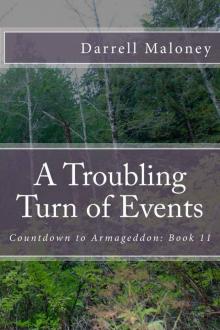 A Troubling Turn of Events
A Troubling Turn of Events The Blockade
The Blockade A Tearful Reunion
A Tearful Reunion Countdown to Armageddon
Countdown to Armageddon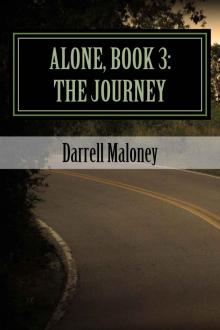 Alone, Book 3: The Journey
Alone, Book 3: The Journey The Army Comes Calling
The Army Comes Calling The Grim Reaper Comes Calling
The Grim Reaper Comes Calling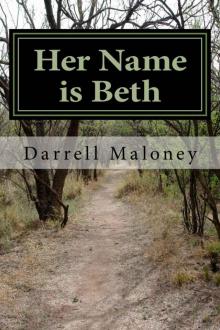 Her Name is Beth: Alone: Book 5
Her Name is Beth: Alone: Book 5 Red: The Adventure Begins
Red: The Adventure Begins Rise From The Ashes: The Rebirth of San Antonio (Countdown to Armageddon Book 3)
Rise From The Ashes: The Rebirth of San Antonio (Countdown to Armageddon Book 3) An Unkind Winter (Alone Book 2)
An Unkind Winter (Alone Book 2)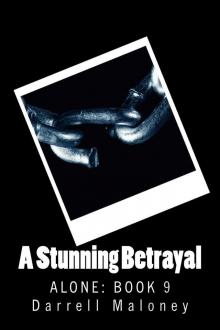 A Stunning Betrayal: Alone: Book 9
A Stunning Betrayal: Alone: Book 9 A Whole New World: Ranger: Book 2
A Whole New World: Ranger: Book 2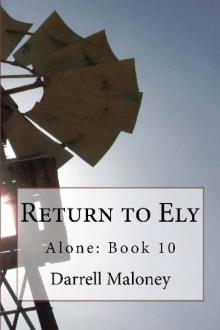 Return To Ely
Return To Ely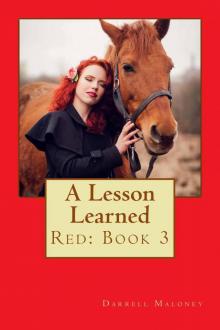 A Lesson Learned: Red: Book 3
A Lesson Learned: Red: Book 3 The Homecoming: Countdown to Armageddon: Book 5
The Homecoming: Countdown to Armageddon: Book 5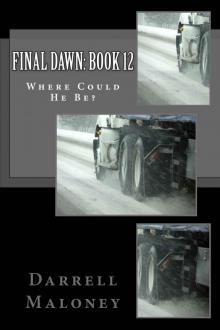 Final Dawn: Book 12: Where Could He Be?
Final Dawn: Book 12: Where Could He Be? An Acquired Taste
An Acquired Taste On Desert Sands: Alone: Book 6
On Desert Sands: Alone: Book 6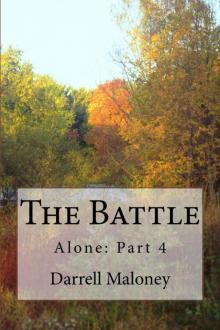 The Battle: Alone: Book 4
The Battle: Alone: Book 4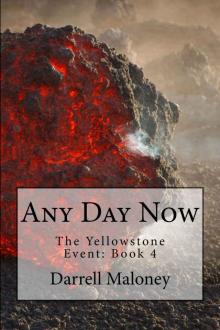 Any Day Now
Any Day Now Too Tough To Tame: Red: Book 2
Too Tough To Tame: Red: Book 2 No Help From Austin: Red: Book 5
No Help From Austin: Red: Book 5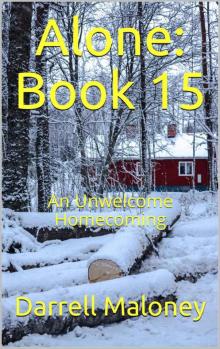 An Unwelcome Homecoming
An Unwelcome Homecoming A New Start: Final Dawn: Book 9 (Volume 9)
A New Start: Final Dawn: Book 9 (Volume 9)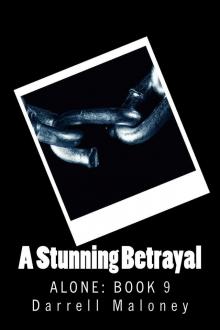 A Stunning Betrayal
A Stunning Betrayal An Undeclared War (Countdown to Armageddon Book 4)
An Undeclared War (Countdown to Armageddon Book 4) One of Our Own: Final Dawn: Book 11
One of Our Own: Final Dawn: Book 11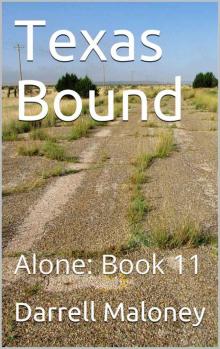 Texas Bound: Alone: Book 11
Texas Bound: Alone: Book 11 Payback: Alone: Book 7
Payback: Alone: Book 7 The Quest: Countdown to Armageddon: Book 6
The Quest: Countdown to Armageddon: Book 6 The Siege
The Siege The Yellowstone Event: Book 1: Fire in the Sky
The Yellowstone Event: Book 1: Fire in the Sky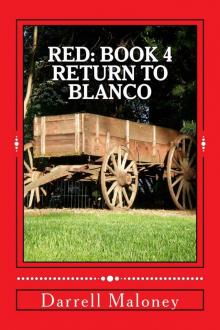 Return to Blanco (Red Book 4)
Return to Blanco (Red Book 4) The Search
The Search AFTER THE DUST SETTLED (Countdown to Armageddon Book 2)
AFTER THE DUST SETTLED (Countdown to Armageddon Book 2) Death Comes Calling (Ranger Book 3)
Death Comes Calling (Ranger Book 3)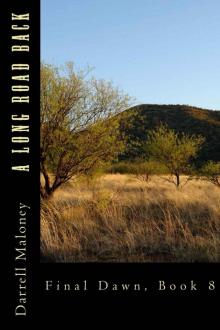 A Long Road Back: Final Dawn: Book 8
A Long Road Back: Final Dawn: Book 8